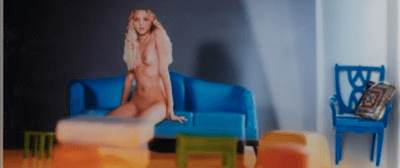When Broadway went dark: One actor’s anxiety-filled year
Greg Hildreth, who played Olaf in 'Frozen' on stage, joins the podcast to discuss the lockdown and returning to work in 'Company'
Like what you’re hearing? Subscribe to us at iTunes, check us out on Spotify and hear us on Google, Amazon, Stitcher and TuneIn. This is our RSS feed. Tell a friend!
If you’re looking for someone to blame the whole pandemic shutdown on, you could do worse than Greg Hildreth. The actor, who had won accolades for his run as Olaf in the Broadway adaptation of “Frozen,” was on a roll. He had done two plays post-Olaf and was set to appear in the revival of Stephen Sondheim’s “Company” when word came down in March 2020 that Broadway would be going dark. Indefinitely.
“I never, in my history of doing shows on Broadway, bought furniture for a dressing room,” says Hildreth. “And I bought a couch for my ‘Company’ dressing room and I feel like I’m singlehandedly responsible for the pandemic.”
Hildreth—who has also appeared in “The Good Place,” “The Americans,” Last Week Tonight with John Oliver,” “Wall Street II” and others—is this week’s guest on “Brooklyn Magazine: The Podcast,” and while he may be joking about being responsible for the lockdown, Broadway’s closure was no laughing matter: The Great White Way contributed some $14.7 billion to New York City’s economy and supported 96,900 jobs during the 2018-2019 season, according to Broadway League.
Almost overnight, nearly 100,000 people were out of work. Hildreth, who lives in Fort Greene and has contributed to Brooklyn Magazine, was one of them. “I am person who gets great anxiety when I see an empty page in a planner,” he says. “I just like to work. I like to be busy. It keeps the demons away.”
In the podcast, Hildreth discusses his childhood in Boston, where at the age of 8 he had developed an obsession with Sondheim, as one does. Not quite the leading man type, Hildreth is a character actor out of the Nathan Lane mold, an actor he says he would love to work with at some point. As such, he was a natural for the role of Olaf, even if he never exactly saw himself manning a 12-pound puppet for a splashy Disney production.
“I had many rant where I was like, ‘I studied Shakespeare and Ibsen!’” he says.
To play Olaf, his feet were attached to the puppet’s feet, which moved when he moved. His left hand controlled Olaf’s arms; his right hand was inside the head, operating the mouth. There were triggers for his thumb that made the puppet blink and movies his eyebrows. All of this and he had to sing and dance and act.
“It was a really fun challenge,” he says
After “Frozen,” he says he had executed “the perfect dismount,” lining up roles in a satiric riff on Chekov’s “Three Sisters” called “Moscow Moscow Moscow Moscow Moscow Moscow,” and in the Broadway revival of Tennessee Williams’ “The Rose Tattoo,” with Marisa Tomei.
The revival of 1970’s “Company,” which is returning to rehearsals this October, flips the gender script of the original, making the central character a perpetual bachelorette instead of an unrepentant bachelor. Originally slated to open on Sondheim’s 90th birthday in 2020, Hildreth anticipates returning to the stage late in the fall, Delta variant permitting.
The Broadway League trade group has declared that audiences will have to be vaccinated and masked to come to the show, says Hildreth. “Which I kind of feared might make people not want to come to the theater. But from what I understand my show at least ‘Company’ experienced a bump in ticket sales. I think that mandate has inspired confidence for people to come indoors. So, yeah, we are moving forward.”
Listen to the podcast for what moving forward looks like, Hildreth’s experiences working with Tomei and Patti LuPone, who is set to star in “Company,” growing up a little different and his pandemic side-hustle: He started painting watercolors of people’s pets and selling them through Instagram.
“None of us had any idea it was going to be this long,” he says. “We kept getting this false hope that we were going to be coming back sooner than we are.”
You might also like 


























